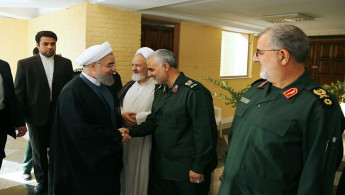Iran's military commander in Syria 'injured'
Iran's military commander in Syria, Qassem Soleimani, was reportedly injured in a rebel attack on his convoy two weeks ago.
Opposition media reported on Tuesday that the head of the Quds Force, the overseas branch of Iran's Revolutionary Guard, was hurt 12 days ago when an anti-tank TOW missile hit the vehicle in which he was travelling in Aleppo province.
Soleimani had kept a low profile in Syria, until more images of the shadowy militia leader emerged over the past few weeks.
Iran has denied the commander had been hurt.
"We consider the reports on his injury as lies aimed at influencing public opinion and the Resistance Front," said General Ramezan Sharifead, head of the Republican Guard's public relations department.
|
|
| Mousawi said that Soleimani had been injured in battle but was 'recovering well' |
However, Iranian journalist Amir Mousawi revealed in a Facebook post on Monday that Soleimani had been injured.
Several opposition sources have claimed that the Iranian militia commander had been severely injured in a TOW missile attack and was flown out to Tehran for treatment.
The reports came amid a rebel advance against regime forces in south Aleppo.
Damascus had already launched an offensive to reclaim territories in what was Syria's largest city, when Russia began its air raids on rebels at the end of September.
The Syrian regime had been successful in capturing several positions from the Islamic State group and ending the extremists' siege on an air force base.
Most of Damascus' successes on the battlefield have only been achieved with a reliance on Iraqi and Lebanese Shia militias, including Hizballah, opposition sources say.
Soleimani - known as the "Shadow Commander" due to his elusive profile - was also said to have directed the military victory at Kuweres air base.
He also said to have been instrumental in shoring up resistance to IS among Iraqi Shia militias in northern Iraq and was photographed with fighters in Tikrit in March.
Iran has long denied that it had any presence in Syria, although it has more recently admitted to supplying the regime with "military advisers".
At least 156 Iranian military personnel have been killed in Syria, according to a study by Foreign Policy.
This includes some high-ranking and mid-level officers such as Brigadier General Reza Khavari and Colonel Mostafa Ezzatollah Soleimani.





 Follow the Middle East's top stories in English at The New Arab on Google News
Follow the Middle East's top stories in English at The New Arab on Google News
![Netanyahu furiously denounced the ICC [Getty]](/sites/default/files/styles/image_330x185/public/2024-11/GettyImages-2169352575.jpg?h=199d8c1f&itok=-vRiruf5)
![Both Hamas and the Palestinian Authority welcomed the ICC arrest warrants [Getty]](/sites/default/files/styles/image_330x185/public/2024-11/GettyImages-2178351173.jpg?h=199d8c1f&itok=TV858iVg)
